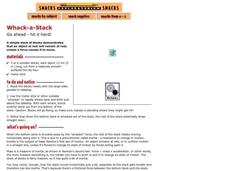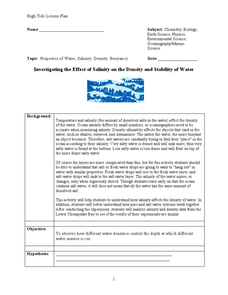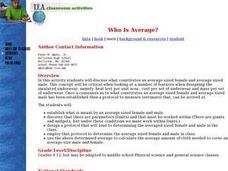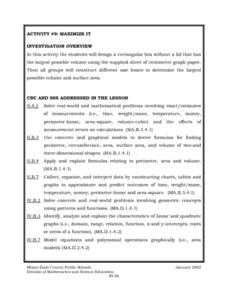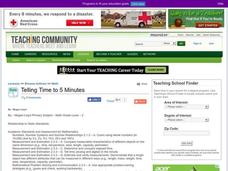CPO Science
Potential and Kinetic Energy
Here's a resource ideal for independent learners who need extra reinforcement or would like to work ahead. These textbook chapters and practice problems cover many basic physics concepts, starting with potential and kinetic energy and...
Exploratorium
Whack-a-Stack
Go wild as you hit a stack of wooden blocks to demonstrate Newton's first and second laws of motion. The blocks at the top of the stack stay put as you knock one at a time out of the bottom. Note, however, that you will need to visit a...
Teach Engineering
Energy Basics
Power up your lessons with an energetic resource. Scholars learn about work, force, energy, and power. They consider the relationships between these quantities through hockey puck scenarios and make calculations using formulas.
Curated OER
Investigating the Effect of Salinity on the Density and Stability of Water
Water with varying amounts of dissolved salt are dyed and then used to compare densities. The objective is to discover the effect of salinity, and therefore density, on ocean water on the stability of the ocean. Many branches of science...
Exploratorium
Resonator
Construct a demonstration apparatus for your lesson on resonance. Instructions are provided here to assemble dowels and balls into swinging objects that have different frequencies. It is a neat visual to include during your lecture if...
NASA
Exploring Data
Bring the sun to your class! Young scholars analyze actual solar wind data in the second lesson plan of a five-part series. Their analysis includes speed, temperature, and density data.
Curated OER
Speed
Fifth and sixth graders practice working in pairs to determine whether they can walk with constant speed. They test themselves, collect their data, draw graphs with their data collected, manipulate the data, and then draw conclusions...
Curated OER
Chemistry Module 2 - Specifications
A valuable resource provides a list of concepts that young chemists should grasp. The topics include energetics, kinetics, equilibria, redox reactions, and the halogen group. Employ this as a guide for your own curriculum planning, or a...
Virginia Department of Education
Weather Patterns and Seasonal Changes
Get your class outside to observe their surroundings with a lesson plan highlighting weather patterns and seasonal changes. First, learners take a weather walk to survey how the weather affects animals, people, plants, and trees during...
Curated OER
Dressing in Early American Times
Fifth graders, by doing research and seeing actual and simulated artifacts, gain knowledge of and make comparisons about clothing in the Colonial and early Republican eras with attire of present time.
Curated OER
The Day The Earth Shook
Students explore structural engineering through three design challenges. They examine information about some architectural features that work and those that don't during an earthquake. Students build and test their structure and record...
Curated OER
Who Is Average?
Students investigate the average sizes for males and females. They discuss averages in relation to the amount of material needed to make underwear. In teams, they create a data table of small, medium, and large sizes and calculate the...
Curated OER
It's About Time
Students create their own timeline. For this social science lesson, students write the important events that happened in their lives on their timeline and then compare their timeline to Earth's timeline.
Curated OER
Dissolved Oxygen
Students discuss the relationships between dissolved oxygen in a stream, stream temperature, organic waste loads, and stream conditions by studying and using a model of dissolved oxygen in the stream.
Curated OER
Strength in Size? Madagascar Cockroach Pulls
Fourth graders conduct an experiment involving size and relative ability in smaller species using Madagascar cockroaches. They make predictions about how many pennies the roaches can pull, compare the results to human strength, and...
Curated OER
Maximize It!
Students design a rectangular box without a lid that has the largest possible volume using the supplied sheet of centimeter graph paper. They work in groups to construct different size boxes to determine the largest possible volume and...
Mabry MS Blog
Scatter Plots
Scatter plots are a fun way to gather and collect relevant data. The presentation goes through several examples and then describes the different types of correlation.
Curated OER
Telling Time to 5 Minutes
In this second grade lesson your class will practice telling time. The goal is to tell time to five minutes using an analog clock. Your young students count by 5 minute intervals and discuss elapsed time.
Curated OER
Antacid Tablet Race
Students complete experiments to determine how rocket fuel is affected by surface area and temperature. They compare the reaction rates of antacid tablets. They discuss their results to complete the lesson.
Shodor Education Foundation
Volume of Prisms
Explore the concept of volume of prisms using an applet to perform the calculations. The link to the interactive applet is embedded into the lesson plan as well as a link to associated data sheets. Get your math class to the computer lab...
Curated OER
Volume of Rectangular Prisms
Introduce the procedure needed to find the volume of a rectangular prism. Learners rank various prisms such as cereal boxes and tissue boxes from smallest to largest volume. They use an applet to find the volume and surface area of each...
Curated OER
Money in Action
Learners become familiar with the various coins in our money system as well as amount of each coin. They help develop their ability to count change and find different ways to show equal amounts.
Curated OER
Maps and Modes, Finding a Mean Home on the Range
Fifth graders investigate data from maps to solve problems. In this data lesson, 5th graders study maps and collect data from each map. Students present their data in a variety of ways and calculate the mode, mean, median, and range.
Curated OER
Newton's Laws of Motion
Ninth graders utilize Newton's Laws of Motion to explain how things move, create poster illustrating each law of motion, and present and explain their poster to classmates.



